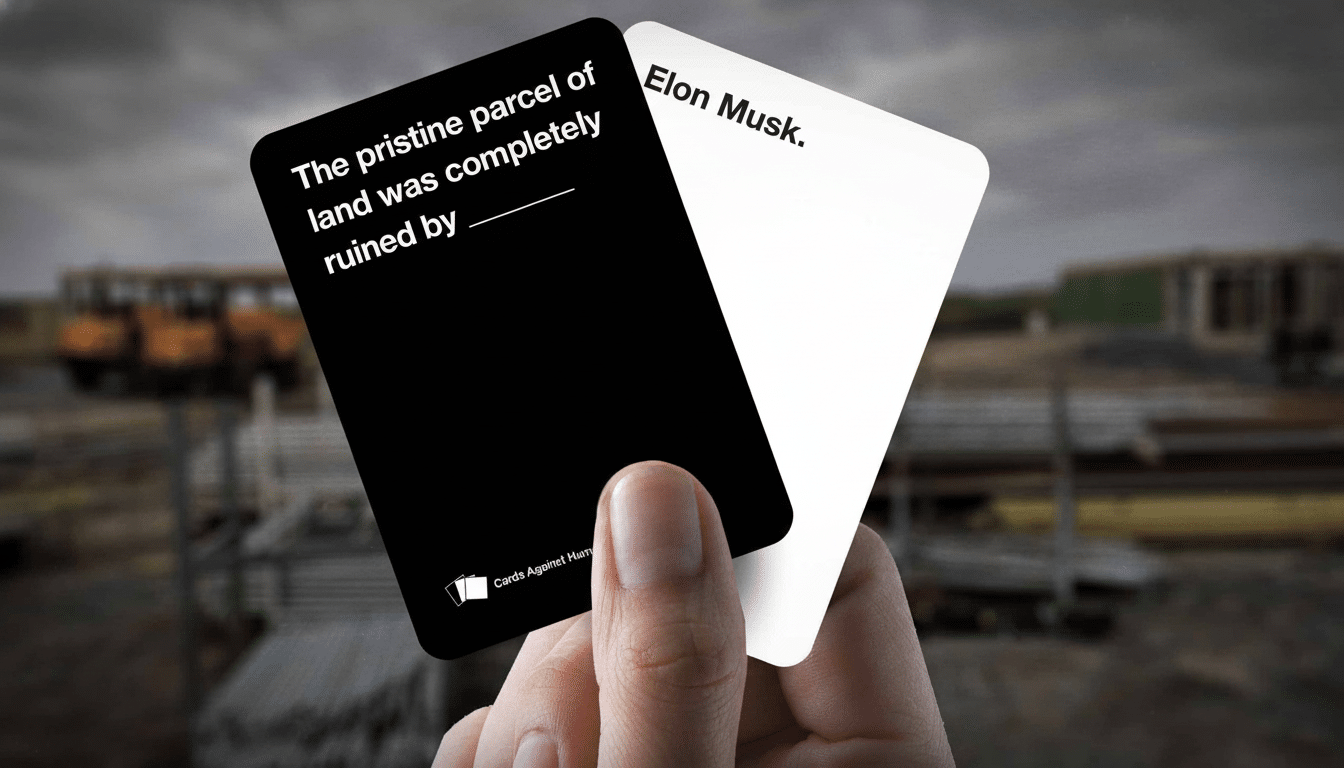Cards Against Humanity says it has successfully evicted SpaceX from a plot of land it owns on the Texas–Mexico border, characterizing the move as a hard-won victory and alleging that the rocket company had been trespassing and staging equipment there without permission.
The card game maker said in an email to customers that during legal discovery, SpaceX admitted it had no permission to use the site. A settlement ensued, shy of the eight figures’ worth of damages the company hoped for, but with the mark in Cards Against Humanity’s win column that it cherished most: SpaceX pulled its gear and left.

How the Dispute Between Cards Against Humanity and SpaceX Began
Cards Against Humanity had purchased the borderland in 2017 as a satirical kickback to muddy the construction of a wall financed by tens of thousands of small-dollar contributors. For years, the land had been largely left alone.
That situation changed when the company says it found tractors, materials, and construction activity associated with SpaceX on the property. The subsequent suit claimed civil trespass and requested restoration and substantial damages for the unauthorized use.
The outlet Ars Technica, which obtained a court filing, reported that SpaceX admitted it had not sought nor obtained permission to enter the land. Court records show the parties reached a settlement before trial, and SpaceX has since carted equipment away.
What the Settlement Means for the Land and Both Parties
The deal seems to prioritize remediation over a massive payout. Cards Against Humanity says it’s contracting with a local construction firm to return the property to its original state, and specifically notes that the land will be restored naturally — no sign of construction debris.
The company had asked for up to $15 million. Equitable relief such as “reasonable restoration of the land damaged, loss of value to the property caused by the damage, loss of use while restoring the property, damages to crops or pasturage, fees for state water,” compensation and — in more limited instances — exemplary damages, are provided by statute. Big asks, for instance, are often whittled down in settlements that ultimately resolve access disputes but don’t require a public admission of liability.
A Flashpoint Near Starbase as SpaceX Operations Expand
What the episode illustrates are the frictions surrounding SpaceX’s fast-expanding operations of its Starship near Boca Chica, where rapid buildouts and launch cadence depend on staging areas, haul routes, and temporary laydown yards.

When that spills onto other people’s parcels without formal arrangements, legal exposure ensues.
Regulators have closely focused on the region. The Federal Aviation Administration has investigated several mishaps associated with early Starship test flights, and the U.S. Fish and Wildlife Service observed debris and a brush fire on nearby refuge lands following one of those tests. In addition, Mexican officials have expressed concerns about cross-border environmental effects.
Environmental groups, the Center for Biological Diversity among them, have also sued in federal court over the environmental impact review that the FAA conducted on Starship, with doubts lingering about how industrial activity intersects more generally with sensitive habitat as well as public access along that coast.
Brand Strategy Meets the Law of Real Property
For Cards Against Humanity, the land purchase was part activism and part theater since its inception. The company says the settlement is expected to finance a free mini-pack of cards mocking Elon Musk for subscribers — not distribute net proceeds from the sale to be allocated to supporters of the original land purchase, as it had previously hoped.
The maneuver is in line with the brand’s history of deploying stunts to earn attention and donations, but it also underscores a practical point: even a small landowner can defend property rights successfully against a much larger neighbor when records, boundaries, and consent are clear.
What to Watch Next as Restoration and Oversight Continue
Restoration will be the first test — putting soil, vegetation, and drainage back to baseline is often one of the more costly elements. Should new issues arise, the settlement terms would decide the possibility of further claims.
For SpaceX, the case is a caution to beef up land-use regulations in and around Starbase. “To the extent you can, when possible on big infrastructure programs, recorded easements and formal laydown leases and neighbor agreements help obviate improvisation at the 11th hour.” The operational risk isn’t just legal — local trust and regulatory patience are limited resources.

